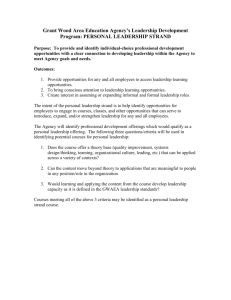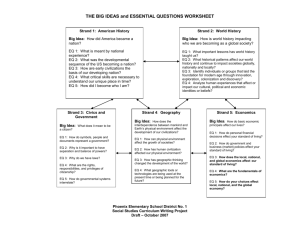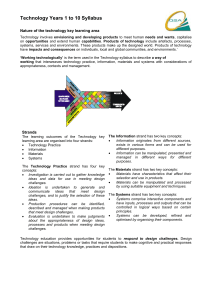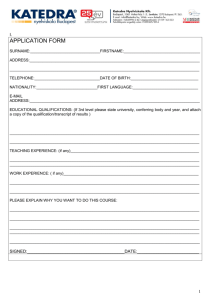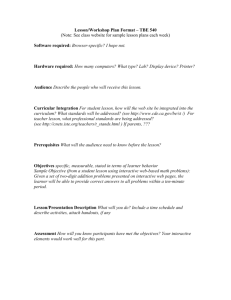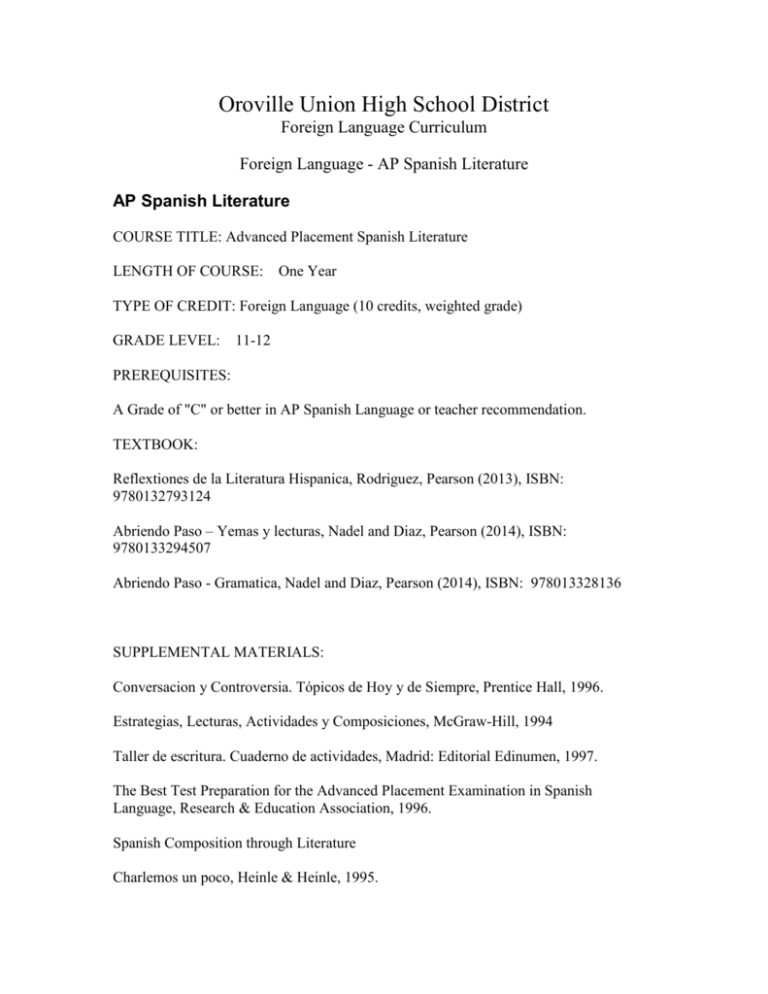
Oroville Union High School District
Foreign Language Curriculum
Foreign Language - AP Spanish Literature
AP Spanish Literature
COURSE TITLE: Advanced Placement Spanish Literature
LENGTH OF COURSE:
One Year
TYPE OF CREDIT: Foreign Language (10 credits, weighted grade)
GRADE LEVEL:
11-12
PREREQUISITES:
A Grade of "C" or better in AP Spanish Language or teacher recommendation.
TEXTBOOK:
Reflextiones de la Literatura Hispanica, Rodriguez, Pearson (2013), ISBN:
9780132793124
Abriendo Paso – Yemas y lecturas, Nadel and Diaz, Pearson (2014), ISBN:
9780133294507
Abriendo Paso - Gramatica, Nadel and Diaz, Pearson (2014), ISBN: 978013328136
SUPPLEMENTAL MATERIALS:
Conversacion y Controversia. Tópicos de Hoy y de Siempre, Prentice Hall, 1996.
Estrategias, Lecturas, Actividades y Composiciones, McGraw-Hill, 1994
Taller de escritura. Cuaderno de actividades, Madrid: Editorial Edinumen, 1997.
The Best Test Preparation for the Advanced Placement Examination in Spanish
Language, Research & Education Association, 1996.
Spanish Composition through Literature
Charlemos un poco, Heinle & Heinle, 1995.
Introducción a la literatura Hispano-americana: de la conquista al siglo XX, Gladys
Varona-Lacey, National Text Book Company, 1997.
How to Prepare for the AP Examination: Spanish, Barron's Educational Series.
SUPPLEMENTAL READING LIST:
Historietas Nacionales, Luis Borges
Ficciones, Luis Borges
Antologia Poelica, Luis Borges
Teatro Completo , Miguel de Cervantes
Don Quijote de la Mancha I and II, John Jay Allen
Doce Cuentos Peveqriuos, Garbriel Marquez
Introduction to Spanish Poetry, Eugenio Florit
El dicario de Cristobal Colon, Mareel Andrade
Antologia Del Cuento Espanol
HispanoAmericano y Puertorriqueno
Siglo XX, Juan Escalera Ortiz
Aventuras Literarias
REQUIRED READING LIST:
MEDIEVAL AND GOLDEN AGE LITERATURE:
Anónimo, "Romance de la pérdida de Alhama" ("Ay de mi Alhama")
Anónimo, "Romance del Conde Arnaldos" (Versión de 26 versos)
Anónimo, Lazarillo de Tormes: Tratados 1, 2, 3, 7
Cervantes Saavedra, Miguel de, El ingenioso hidalgo, don Quujote de la Mancha:
Primera parte, Capítulos 1, 11, 111, IV, V y VIII
Cruz, Sor Juana Inés de la, 'En perseguirme, Mundo, ¿qué interesas?" (Quéjase de la
suerte: insinúa su aversión a los vicios, y justifica su divertimiento a las Musas)
"Hombres necios que acusáis" (Sátira filosófica: Arguye de inconsecuencia el gusto y la
censura de los hombres que en las mujeres acusan lo que causan)
Góngora y Argote, Luis de, Soneto CLXVI ("Mientras por competir con tu cabello")
Juan Manuel, Infante de Castilla, Conde Lucanor. Exemplo XXXV.' ("Lo que sucedió a
un mozo que casó con una mujer muy fuerte y muy brava)
Núñez Cabeza de Vaca,Álvar, Naufragios. Capítulo XII ("Cómo los indios nos trajeron
de comer), Capítulo XX ("De cómo nos huimos"), Capítulo XXI ("De cómo curamos
aquí unos dolientes"), Capftulo XXH ("Cómo otro día nos trajeron otros enfermos")
Quevedo y Villegas, Francisco de, Un heráclito cristiano: Salmo XVII ("Miré los muros
de la patria mía)
Téllez, Gabriel (Tirso de Molina), El burlador de Sevilla y convidado, de piedra
Vega, Garcilaso de la, Soneto XXIII ("En tanto que de rosa y de azucena")
NINETEENTH CENTURY LITERATURE:
Alas, Leopoldo (Clarín), "Adiós, Cordera"
Bécquer, Gustavo Adolfo, Rima IV ("No digáis que agotado su tesoro")
Rima XI ("Yo soy ardiente, yo soy morena")
Rima LIII ("Volverán las oscuras golondrinas")
Darío, Rubén (Félix Rubén García Sarmiento), Cantos de vida y
esperanza: Otros poemas, VI ("Canción de otoño en primavera")
Cantos de vida y esperanza: Otros poemas, XLI ("Lo fatal")
Cantos de vida y esperanza, VIII ("A Roosevelt")
Espronceda, José de, "Canción del pirata"
Heredia, José Maria, "En una tempestad"
Larra, Mariano José de, "Vuelva Ud. mañana"
Marti, José, "Dos patrias" ("Dos patrias tengo yo: Cuba y la noche")
Versos sencillos, I ("Yo soy un hombre sincero")
Palma, Ricardo, "El alacrán de Fray Gómez"
Pardo Bazán, Emilia, "Las medias rojas"
TWENTIETH CENTURY LITERATURE:
Allende, Isabel, "Dos palabras"
Borges, Jorge Luis, "El sur"
"La muerte y la brújula"
Burgos, Julia de, "A Julia de Burgos"
Castellanos, Rosario, "Autorretrato"
Cortázar, Julio, "Continuidad de los parques"
"La noche boca arriba"
Fuentes, Carlos, "Chac Mool"
García Lorca, Federico, La casa de Bernarda Alba
Dos romances del Romancero gitano
García Márquez, Gabriel, Tres cuentos, elegidos de la lista siguiente:
"Un día de éstos"
'El ahogado mis hermoso del mundo"
"La prodigiosa tarde de Baltazar"
"Un señor muy viejo con unas alas enormes"
"La viuda de Montiel"
"La siesta del martes"
Guillén, Nicolás, "Balada de los dos abuelos"
"Sensemayá"
Machado, Antonio, "He andado muchos caminos"
"La primavera besaba"
"Caminante, son tus huellas"
Martín Gaite, Carmen, "Las ataduras"
Neruda, Pablo (Ricardo Neftalí Reyes Basoalto), "Oda a la alcachofa
Resideneia en la Tierra 2, 'Walking around"
Veinte poemas de amor y una canción desesperada,
Poema 15 ("Me gustas cuando callas porque estás como ausente")
Quiroga, Horacio, "El hijo"
Rulfo, Juan, "No oyes ladrar los perros"
Storni, Alfonsina, "Peso ancestral"
"Tú me quieres blanca"
Ulibarrí Sabine R., "Mi caballo mago"
Unamuno y Jugo, Miguel de, San Manuel Bueno, mártir
Vodanovic, Sergio, El delantal blanco
COURSE DESCRIPTION:
The AP Spanish Literature course is intended to be the equivalent of a third-year college
Introduction to Latin American or Peninsular Literature course, covering selected works
from the literatures of Spain and Spanish America. Students will read and analyze
literature orally and in writing. The function of the AP Spanish Literature course is to
prepare students to:
1. understand a lecture in Spanish and to participate actively in discussions on litterary
topics in Spanish;
2. do a close reading of literary texts of all genres in Spanish; and
3. analyze critically the form and content of literary works (including poetry) orally and
in writing using appropriate terminology.
The reading list introduces studens to the diverse literature written in Spanish and thus
helps them to reflect on the many voices and cultures that make up the Spanish-speaking
world.
BOARD ADOPTION DATE: NOVEMBER 3, 2004
Interpersonal Communication
Standard 1.1: Students engage in conversation, provide and obtain information, express feelings
and emotions and exchange opinions.
1. Oral Fluency in Language
The learner will be able to express facts, ideas, and feelings in a manner that is
intelligible to a native Spanish-speaker.
Strand
Interpersonal Communication
Scope Source
Master Oroville Union High School District(a)
2. Summarizing a Story
The learner will be able to use acquired vocabulary to summarize a story.
Strand
Interpersonal Communication
Scope Source
Master Oroville Union High School District(a)
3. Verb Tense Use
The learner will be able to narrate, describe, and explain in the past, present, future,
imperfect, conditional, present perfect, pluperfect, future perfect and conditional
perfect tenses, using appropriate grammatical structures.
Strand
Interpersonal Communication
Scope Source
Master Oroville Union High School District(a)
4. Question Formulation
The learner will be able to formulate questions that clarify meaning and participate in
class discussions.
Strand
Interpersonal Communication
Scope Source
Master Oroville Union High School District(a)
Interpretive Communication
Standard 1.2: Students understand and interpret written and spoken language on a variety of
topics.
1. Literary Genre
The learner will be able to read, understand and analyze works representing a variety
of genres from the required reading list (i.e., poetry, essays, plays, novels, journals,
biographies, short stories, historical fiction, non-fiction, and legend).
Strand
Interpretive Communication
Scope Source
Master Oroville Union High School District(a)
2. Magazine & Newspaper Articles
The learner will be able to have an overall comprehension of magazine and newspaper
articles.
Strand
Interpretive Communication
Scope Source
Master Oroville Union High School District(a)
3. Radio & Television Programs
The learner will be able to understand standard Spanish on radio or television
programs.
Strand
Interpretive Communication
Scope Source
Master Oroville Union High School District(a)
4. Speaker Point of View
The learner will be able to recognize the purpose and motivation of speakers.
Strand
Interpretive Communication
Scope Source
Master Oroville Union High School District(a)
5. Paraphrasing & Summarizing Ideas
The learner will be able to paraphrase and summarize ideas or concepts from a text.
Strand
Interpretive Communication
Scope Source
Master Oroville Union High School District(a)
6. Literary Elements
The learner will be able to identify and explain important literary elements in works
from the required reading list (i.e., plot, character, theme, setting, tone, rhyme scheme,
meter, similes, metaphors, personification, illusion, characterization,
compare/contrast, description, quotations, and sensory images).
Strand
Interpretive Communication
Scope Source
Master Oroville Union High School District(a)
Presentational Communication
Standard 1.3: Students present information, concepts and ideas to an audience of listeners or
readers on a variety of topics.
1. Audiences & Purposes in Writing
The learner will be able to write for a variety of audiences and purposes.
Strand
Presentational Communication
Scope Source
Master Oroville Union High School District(a)
2. Writing Modes
The learner will be able to write in a variety of modes (i.e., narrative, expository,
persuasive, imaginative).
Strand
Presentational Communication
Scope Source
Master Oroville Union High School District(a)
3. Timed Writing
The learner will be able to respond efficiently to a prompt in a timed writing.
Strand
Presentational Communication
Scope Source
Master Oroville Union High School District(a)
4. Essay Writing
The learner will be able to develop essays in which include a thesis statement, clear
organization, logical topic sentences, supporting details, transitions, examples, and a
conclusion. The essays must adhere to target language conventions (i.e.,
capitalization, periods, commas, accents, and spelling).
Strand
Scope
Source
Presentational Communication
Master Oroville Union High School District(a)
5. Writing as a Process
The learner will be able to utilize the writing process (prewriting, drafting, revising,
rewriting, and editing).
Strand
Scope
Source
Presentational Communication
Master Oroville Union High School District(a)
Practices of Culture
Standard 2.1: Students demonstrate an understanding of the relationship between the practices
and perspectives of the culture studied.
1. Communication Cues
The learner will be able to identify cues that affect meaning in communication
(inflection, facial expressions, body language, old popular sayings).
Strand
Scope
Source
Practices of Culture
Master
Oroville Union High School District(a)
2. Culturally Correct Topics
The learner will be able to determine appropriate topics of interaction (culturally
correct).
Strand
Scope
Source
Practices of Culture
Master
Oroville Union High School District(a)
3. Idiomatic & Colloquial Expression
The learner will be able to understand readings that may include idiomatic and
colloquial expressions.
Strand
Scope
Source
Practices of Culture
Master
Oroville Union High School District(a)
4. Debates on Social Issues
The learner will be able to participate in debates on social issues.
Strand
Scope
Source
Practices of Culture
Master
Oroville Union High School District(a)
Products of Culture
Standard 2.2: Students demonstrate an understanding of the relationship between the products
and perspectives of the culture studied.
1. Themes, Ideas, & Perspectives
The learner will be able to recognize, analyze and synthesize themes, ideas and
perspectives of the culture through its history, literary works and other art forms.
Strand
Products of Culture
Scope
Master
Source
Oroville Union High School District(a)
2. Analysis of Current Events
The learner will be able to read about current events and analyze its effects in society.
Strand
Products of Culture
Scope
Master
Source
Oroville Union High School District(a)
3. Foreign Governments & Societies
The learner will be able to discuss foreign governments and challenges society faces
regarding corruption, human rights, etc.
Strand
Products of Culture
Scope
Master
Source
Oroville Union High School District(a)
4. Cultural Exploration with Technology
The learner will be able to explore target culture through the use of technology.
Strand
Products of Culture
Scope
Master
Source
Oroville Union High School District(a)
Connecting with other Disciplines
Standard 3.1: Students reinforce and further their knowledge of other disciplines through the
foreign language.
1. Reports in the Language
The learner will be able to prepare reports on various topics and present them to the
class in target language.
Strand
Connecting with other Disciplines
Scope Source
Master Oroville Union High School District(a)
2. Essays on Current & Historical Ev
The learner will be able to compose well-organized and coherent essays on current
and historical events related to the required reading list.
Strand
Connecting with other Disciplines
Scope Source
Master Oroville Union High School District(a)
3. Literature Analysis
The learner will be able to use target language to analyze literature and explore
universal themes (death, love, justice, etc.).
Strand
Connecting with other Disciplines
Scope Source
Master Oroville Union High School District(a)
Accessing Information in the Target Lang
Standard 3.2: Students acquire information and recognize the distinctive viewpoints that only are
available through the foreign language and its cultures.
1. Original & Translated Literature
The learner will be able to compare original literary works with their translated
versions.
Strand
Scope Source
Accessing Information in the Target Lang
Master Oroville Union High School District(a)
2. Newspapers & Current Events
The learner will be able to read newspaper articles from foreign countries and discuss
current events, entertainment news', etc.
Strand
Scope Source
Accessing Information in the Target Lang
Master Oroville Union High School District(a)
Language Comparisons
Standard 4.1: Students demonstrate an understanding of the language through comparisons of
the language studied and their own.
1. Rhetorical & Oratorical Technique
The learner will be able to use rhetorical and oratorical techniques specific to the
target language.
Strand
Scope
Source
Language Comparisons
Master
Oroville Union High School District(a)
2. Grammar & Syntax
The learner will be able to explore language differences in grammar rules, syntax, etc.
Strand
Scope
Source
Language Comparisons
Master
Oroville Union High School District(a)
3. Language Forms
The learner will be able to explore unique language forms from various geographical
locations.
Strand
Scope
Source
Language Comparisons
Master
Oroville Union High School District(a)
Instructional Resources
- On-line, Spanish Proverbs [Online]. http://spanishculture.miningco.com/culture/spanishculture/library/proverbs/blproverbs.htm
Cultural Comparisons
Standard 4.2: Students demonstrate an understanding of the concept of culture through
comparison of the cultures studied and their own.
1. Important Individuals in the Culture
The learner will be able to identify outstanding individuals, research their
contributions to the target culture and explain how they made a difference in our
world.
Strand
Cultural Comparisons
Scope
Master
Source
Oroville Union High School District(a)
2. Socio-Ethnic Groups
The learner will be able to identify major socio-ethnic groups of the target culture and
their contributions to our culture.
Strand
Cultural Comparisons
Scope
Master
Source
Oroville Union High School District(a)
3. Role-Playing in the Culture
The learner will be able to demonstrate knowledge of cultural appropriate behaviors
through role-play.
Strand
Cultural Comparisons
Scope
Master
Source
Oroville Union High School District(a)
4. Effects of Cultural Attitudes
The learner will be able to discuss how cultural attitudes can limit or enhance the
success of any ethnic group.
Strand
Cultural Comparisons
Scope
Master
Source
Oroville Union High School District(a)
Personal Enrichment
Standard 5.2: Students show evidence of becoming lifelong learners by using the language for
personal enjoyment and enrichment.
1. Magazines & Newspapers
The learner will be able to read magazines, newspapers in the target language.
Strand
Personal Enrichment
Scope
Master
Source
Oroville Union High School District(a)
2. Television, Movies, & News Report
The learner will be able to watch television programs, movies, news, etc.
Strand
Personal Enrichment
Scope
Master
Source
Oroville Union High School District(a)
3. Interpersonal Relationships
The learner will be able to establish interpersonal relationships with speakers of the
target language.
Strand
Personal Enrichment
Scope
Master
Source
Oroville Union High School District(a)
4. Critical Thinking
The learner will be able to use critical thinking skills to evaluate cultural activities.
Strand
Personal Enrichment
Scope
Master
Source
Oroville Union High School District(a)
© 2010 by Oroville Union High School District and Scantron Corporation. All Rights Reserved. Made with Curriculum Designer by
Scantron Corporation.

